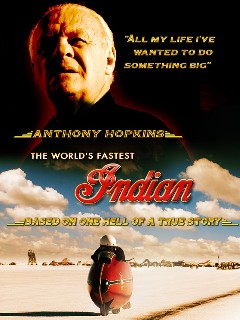 Anthony Hopkins is grandfatherly. He’s soft spoken and laughs a lot and seems to happy to get his reminiscence on, just like a grandfather. After meeting him it’s hard to imagine him eating Ray Liotta’s brain – and then right at the end of the interview he did that lip smacking noise that Hannibal makes when he does the Fava Bean speech – and you’re suddenly creeped out.
Anthony Hopkins is grandfatherly. He’s soft spoken and laughs a lot and seems to happy to get his reminiscence on, just like a grandfather. After meeting him it’s hard to imagine him eating Ray Liotta’s brain – and then right at the end of the interview he did that lip smacking noise that Hannibal makes when he does the Fava Bean speech – and you’re suddenly creeped out.
Hopkins’ newest film is The World’s Fastest Indian, which does not have him playing Gandhi breaking the four minute mile, but rather a New Zealander named Burt Munro, an old coot with an old Indian motorbike who wants to travel to America to race his souped up cycle at Bonneville Flats speedway, to see how fast he can make it go. It’s a true(ish) story – director Roger Donaldson knew the real Burt Munro, and made a documentary about him called Offerings to the God of Speed.
The World’s Fastest Indian is coming to theaters this weekend.
Q: When did you first hear of Burt’s story, and why did you want to play him?
Hopkins: Roger Donaldson sent me the DVD of the documentary and the script and he said, “Watch the documentary first and then read the script, tell me what you think.” So I watched the documentary and thought it was very good. I read the script the next day and phoned him and said I’d like to do it.
Q: Burt’s got such a wide-eyed view of the world.
Hopkins: Yeah, it’s a bit like me when I came to America. I’m pretty wide-eyed. I’m always taken by surprise by things. And that’s how I’ve treated my whole life actually—always being in a straight of surprise. I moseyed onto this train called show business many years ago, and I’m still going. So it’s a pleasant journey.
Q: That seems to have changed, because in the press notes you mentioned working with Roger on The Bounty and said you were much more temperamental back then, and that you would argue or scream with a director. I’m wondering if you’ve just mellowed?
Hopkins: Yeah. Well, Roger was the same—we met about 3-4 years ago at a party and we’ve both mellowed out a bit. I think as you get older, you get a bit more sensible, get a better perspective of things. I figured out some years ago that the director is in charge of the movie. That doesn’t mean to say that every director is good or every actor is good, but the director—that’s his job to run the movie, he’s the boss. I remember the first day we were filming, when the wheel comes off the trailer, and Roger said, “Can we do another take?” and I said “Yeah, you sure?” So we did about 15 takes. [laughs]. He’s a perfectionist and he wants to get it right, and I imagine this is the program, just go along with it.
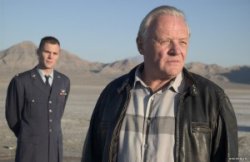 Q: When you look back at your younger self, do you say ‘What a hothead I was!’ or ‘Why was I that way?’
Q: When you look back at your younger self, do you say ‘What a hothead I was!’ or ‘Why was I that way?’
Hopkins: I don’t regret it, that’s the way it was then. When you’re younger you have a lot of ideas and you’re probably more insecure, all those things. I work with young actors now and I see their insecurities and I make fun of them. I don’t make fun of them but I make them laugh, because I know what they’re going through. When you get older you think ‘It’s only a movie after all, it’s not brain surgery.’
Q: You have said that you became an actor because you didn’t do well in school.
Hopkins: I just probably couldn’t figure out anything when I was in school and so I became an actor because I didn’t know what else to do. Academically I wasn’t good. I was just slow or different. I remember kids in school who could understand math, and we had one guy in school who was a genius, and I don’t know what happened to him. He ended up driving some truck, and he was brilliant in school, good student. David Davis his name was—amazing, and I hated him (laughs). He never did any homework and he just got it all the time. I didn’t have that kind of mind structure and I think we’re all different. Some people are musicians, some people are actors, some are accountants, agents, newspaper guys, drivers, etc.
Q: How has your approach to roles changed in recent years?
Hopkins: I’ve always taken the same method, which is to learn the lines literally. I learn the text, I read the script maybe twice, and I go over my text of the lines. I get a rhythm in my head and then I can hear rhythms which click. With certain rhythms of speech I think, ‘This is interesting’ and I let them take me into a new area. I begin to feel like someone else—I’m not schizophrenic or anything—but just to use another rhythm of my own self.
Q: Burt feels like his whole life has been leading up to that first race that’s portrayed in the movie. Do you feel that you’ve had your Bonneville moment or do you feel like you’re still waiting?
Hopkins: I feel like when I first came to New York, 30 odd years ago. I remember I had been living in England for years and wanted to come to America. I remember getting up in the morning at the Algonquin in September in 1974, and I went on 5th avenue to get a newspaper and I thought, ‘I’m home’. I had that feeling about it, and that scene where Burt arrives at Bonneville, I’d learned that speech and not that it’s a huge moment being in Bonneville because I’m not interested in world speed records. But I remember doing that scene, it was a cold morning and Roger said “Action!” and I got quite emotional about it, because it was similar to my own life in a way.
Q: Which role has eluded you the most? Which did you find the most difficult?
Hopkins: I think Nixon. To play an American President, that’s a bit of a stretch of imagination [laughs]. Oliver Stone is an amazing director and he put the pressure on. I didn’t want to do it, and I remember he came to England to meet me and I’d already turned it down. He said, “Chicken, huh?” [laughs].
I remember going to meet him on that morning at the Hyde Park Hotel, and I had a moment of clarity—I can stay here in Britain and play nice, boring safe parts in BBC [snore sound], or I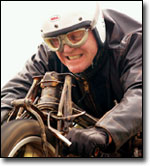 can work with this crazy director in America and maybe fall on my backside or make a success of it. I just thought well, I’ll just take the risk. And I went to the hotel and Oliver gruffled and said “Chicken, huh?” and I said, “No, I’m going to do it.” I said yes and I went to America and I remember learning the script and thought, ‘What have I done? I’ve taken on this nightmare.’ Then I went to California and started rehearsing and realized I was in the hands of a great director. He puts a lot of pressure on you, and you get to a point where you either crack or you get it. He was relentless until I got the feeling of the part, and I really liked Oliver.
can work with this crazy director in America and maybe fall on my backside or make a success of it. I just thought well, I’ll just take the risk. And I went to the hotel and Oliver gruffled and said “Chicken, huh?” and I said, “No, I’m going to do it.” I said yes and I went to America and I remember learning the script and thought, ‘What have I done? I’ve taken on this nightmare.’ Then I went to California and started rehearsing and realized I was in the hands of a great director. He puts a lot of pressure on you, and you get to a point where you either crack or you get it. He was relentless until I got the feeling of the part, and I really liked Oliver.
Q: When you’re playing a real person like Nixon or Burt, how important is it for you to be accurate to that person, and how important is it to have freedom to create your own character?
Hopkins: If you get accurate—I mean, I can never become accurate. I don’t look anything like Nixon or the real Burt Munro. Nixon’s face has got a long nose. We tried to make a nose and all that and I said ‘This isn’t working’ and they did the hair. But if I was Rich Little or Fran Gorshin or these great mimics, they’re brilliant. Actually Rich Little came to the set of Nixon one day and I resisted doing Rich Little, because if you do that, you become a mimic. And with an accent like this guy—a New Zealand accent—if you strive to get it absolutely accurate then it’s not a performance; it’s a mask. You may as well make a Nixon funny head or a Burt Munro mask, because that’s not what acting is about. That’s my opinion. So you just airbrush it in, a couple of pen strokes here and there. The New Zealand accent was easier for me because Burt sounds a little bit Cornish or Irish, so it was easier than North Islanders, which are a much more pinched sound.
Q: There was a poll done by the Old Vic Theater and you came off as the number one British actor of all time, ahead of Laurence Olivier, Alec Guinness, Michael Caine…and Judi Dench was your counterpart. Do you think you’re that great?
Hopkins: I honestly don’t know. It’s a source of puzzlement for me, and I’m very pleased if they call me that. I thought a lot lately about it, and I honestly don’t know. I blush a bit, because I worked with Olivier and he’s a great actor. And I’ve seen those guys like Alec Guinness. It’s great to be told that, but I remember thinking I’ve gotten a few enemies in England now. Maybe I have an attitude, and I don’t know what’s happened to me over the last few years, except that some things opened up in me and… I don’t take it seriously.
But I do my job, and I do what I’m paid to do and I’m always prepared. I prepare by learning the text so well that when I show up, I’m relaxed and the performance sort of happens. Now whether that’s good or bad, I don’t know, and I’ve been in some films that were bad and given some bad performances as well. But maybe people respond in a way—whatever I say is going to sound very egocentric and self centered anyway so I’d better shut up. But when they say that, I think ‘oh well’. I got the Cecil B. DeMille Award recently…but I’m still up there thinking, ‘Have they got the right person’? [laughs] I still do that.
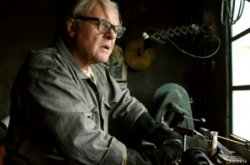 Q: You’ve spoken a few times about rhythms and sounds, and finding character. I think you also compose. Is there a connection there? Is that one of your major ways into your art?
Q: You’ve spoken a few times about rhythms and sounds, and finding character. I think you also compose. Is there a connection there? Is that one of your major ways into your art?
Hopkins: I suppose so. I don’t necessarily analyze it but I started off when I was a little kid playing a piano and I wanted to be a musician. I say that in retrospect, I don’t know how much I wanted to be. I just wanted to be famous because I wanted to escape from what I felt was my limitation in life because I wasn’t a good student. And I wanted to write music, and I didn’t know what I was doing and I never had the technique or understanding of it. Academically, I don’t grasp things at all well. But I’ve always played the piano and I can improvise on the piano, but the problem is that I can’t write down what I write. I can read music but I can’t write numbers; I don’t have knowledge. My wife said, “That’s beautiful, why don’t you get some help?” so I phoned up somebody who she knew, whose a composer and musician in his own right, and I went to his studio and he gave me the freedom of his studio where I could synthesize a keyboard. I know my way around instruments so we became good friends, and he’s got no ego at all. He helped me with all the electronics stuff on the computer because I don’t understand that but I’m learning. And I’m learning orchestration.
I built the first big piece I have called “Margam,” which is where I was born. It sounds pretty good, and it’s being performed in San Antonio in May in the symphony orchestra down there. Music has always been with me but my wife sort of turned the key in me and said I am a musician. And with paintings, she got me to do some paintings for this gallery in San Antonio again. So we’ll be combining an art exhibition — it sounds like a real ego trip, this [laughs] — but she said she wants me to do 100 paintings for this little gallery. So I did these little pen drawings, with felt pen and brushes. So I paint these landscapes and I change colors, and she got me to do acrylics. I’ve done 25 acrylics for the library and I go down to San Antonio on Thursday to see the orchestra. I figure the thing is not to analyze it, and people say ‘Oh you’ve got no technique’ and I said to hell with it, people seem to like it and they want to buy it [laughs]. I think it’s all a happy design. I’m not saying I’m Picasso, but I do enjoy the freedom of free expression without knowing anything about it.
Q: It says in the notes that you’re a happy man, and because of that you don’t really want to play villains or psychotic people anymore. Is that true?
Hopkins: Oh, yeah. But actually my next movie is with Ryan Gosling and I play a man that kills his own wife—she’s having an affair—but it’s not Hannibal Lecter. This man is a little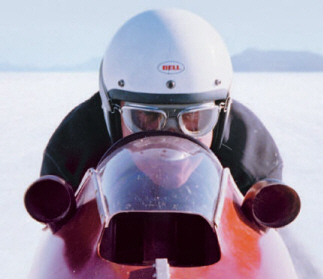 strange but he’s on the surface very normal, very quiet, and he kills his wife because she’s having an affair. It’s a revenge thing but he sets up a test. This guy is involved with those Ruth Goldberg machines and he designs the perfect murder but he leaves one flaw.
strange but he’s on the surface very normal, very quiet, and he kills his wife because she’s having an affair. It’s a revenge thing but he sets up a test. This guy is involved with those Ruth Goldberg machines and he designs the perfect murder but he leaves one flaw.
Q: Is it true you’re coming to do narration for the next Hannibal film?
Hopkins: No, that’s a dumb rumor.
Q: So you’re all done with Hannibal?
Hopkins: Oh, yeah.
Q: At the Golden Globes when they gave you the De Mille award, they said (about Hannibal), this is the #1 villain of all time in the movies. Did you find, in a way, that is a thing around your neck? A hard thing to get rid of?
Hopkins: No, but people want me to do the Fava Bean speech all the time.